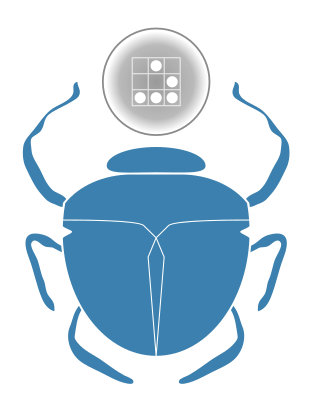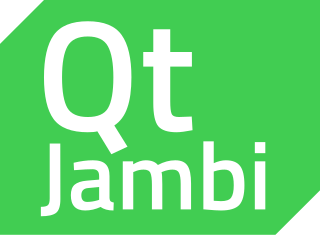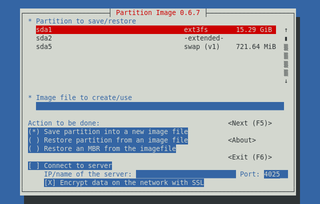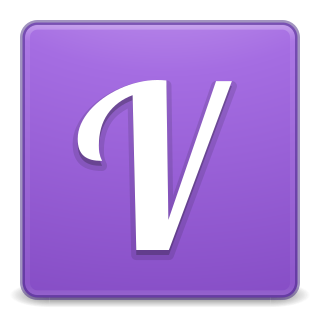See also
- R (programming language) (The R statistical programming language)
| Developer(s) | Michael Lawrence and Duncan Temple Lang |
|---|---|
| Stable release | 2.20.36 [1] / 8 March 2019 |
| Operating system | Cross-platform |
| Platform | Cross-platform |
| Type | widget toolkit |
| License | GPL |
| Website | www.ggobi.org/rgtk2 |
RGtk2 is a set of R wrappers for the GTK+ graphical user interface library. RGtk2 is free software and licensed under the GPL.
The code below will produce a 200x200 pixel window with the words "Hello World" inside.
library(RGtk2)createWindow<-function(){window<-gtkWindow()label<-gtkLabel("Hello World")window$add(label)}createWindow()gtk.main()RGtk2 has been used in a number of notable applications, some examples:

Gambas is an object-oriented dialect of the BASIC programming language, and an integrated development environment that accompanies it. Designed to run on Linux and other Unix-like computer operating systems, its name is a recursive acronym for Gambas Almost Means Basic. Gambas is also the word for prawns in the Spanish, French, and Portuguese languages, from which the project's logos are derived.

The Standard Widget Toolkit (SWT) is a graphical widget toolkit for use with the Java platform. It was originally developed by Stephen Northover at IBM and is now maintained by the Eclipse Foundation in tandem with the Eclipse IDE. It is an alternative to the Abstract Window Toolkit (AWT) and Swing Java graphical user interface (GUI) toolkits provided by Sun Microsystems as part of the Java Platform, Standard Edition (J2SE).

Fast Light Toolkit (FLTK) is a cross-platform widget library for graphical user interfaces (GUIs), developed by Bill Spitzak and others. Made to accommodate 3D graphics programming, it has an interface to OpenGL, but it is also suitable for general GUI programming.

PyGTK is a set of Python wrappers for the GTK graphical user interface library. PyGTK is free software and licensed under the LGPL. It is analogous to PyQt/PySide and wxPython, the Python wrappers for Qt and wxWidgets, respectively. Its original author is GNOME developer James Henstridge. There are six people in the core development team, with various other people who have submitted patches and bug reports. PyGTK has been selected as the environment of choice for applications running on One Laptop Per Child systems.
The FOX toolkit is an open-source, cross-platform widget toolkit, i.e. a library of basic elements for building a graphical user interface (GUI). FOX stands for Free Objects for X.

Cairo is an open-source graphics library that provides a vector graphics-based, device-independent API for software developers. It provides primitives for two-dimensional drawing across a number of different backends. Cairo uses hardware acceleration when available.

PHP-GTK is a set of language bindings for the programming language PHP which allow GTK graphical user interface (GUI) applications to be written in PHP. PHP-GTK provides an object-oriented programming interface to GTK classes and functions. PHP-GTK partly supports GTK2, but GTK3 is unsupported.
gtkmm is the official C++ interface for the popular GUI library GTK. gtkmm is free software distributed under the GNU Lesser General Public License (LGPL).

CMake is a free, cross-platform, software development tool for building applications via compiler-independent instructions. It also can automate testing, packaging and installation. It runs on a variety of platforms and supports many programming languages.
Gtk2-Perl is a set of wrappers for the Perl programming language around the GTK and further GNOME libraries. Gtk-Perl is free and open-source software licensed under the GNU Lesser General Public License (LGPL) version 2.1. Developers and interested parties can usually be found on the IRC channel #gtk-perl on irc.gnome.org.

QtJambi is a Java binding of the cross-platform application framework Qt. It enables Java developers to use Qt within the Java programming language. In addition, the QtJambi generator can be used to create Java bindings for other Qt libraries and future versions of Qt. Unlike GTK, there are no Swing LAF implementations that use Qt for rendering.

Newt is a programming library for color text mode, widget-based user interfaces. Newt can be used to add stacked windows, entry widgets, checkboxes, radio buttons, labels, plain text fields, scrollbars, etc., to text user interfaces. This package also contains the shared library needed by programs built with newt, as well as a CLI application whiptail, which provides the most commonly used features of dialog. Newt is based on the slang library. It abbreviates from Not Erik's Windowing Toolkit.
A software repository, or repo for short, is a storage location for software packages. Often a table of contents is also stored, along with metadata. A software repository is typically managed by source or version control, or repository managers. Package managers allow automatically installing and updating repositories, sometimes called "packages".

Vala is an object-oriented programming language with a self-hosting compiler that generates C code and uses the GObject system.
GGobi is a free statistical software tool for interactive data visualization. GGobi allows extensive exploration of the data with Interactive dynamic graphics. It is also a tool for looking at multivariate data. R can be used in sync with GGobi. The GGobi software can be embedded as a library in other programs and program packages using an application programming interface (API) or as an add-on to existing languages and scripting environments, e.g., with the R command line or from a Perl or Python scripts. GGobi prides itself on its ability to link multiple graphs together.
Enthought, Inc. is a software company based in Austin, Texas, United States that develops scientific and analytic computing solutions using primarily the Python programming language. It is best known for the early development and maintenance of the SciPy library of mathematics, science, and engineering algorithms and for its Python for scientific computing distribution Enthought Canopy.

PySide is a Python binding of the cross-platform GUI toolkit Qt developed by The Qt Company, as part of the Qt for Python project. It is one of the alternatives to the standard library package Tkinter. Like Qt, PySide is free software. PySide supports Linux/X11, macOS, and Microsoft Windows. The project can also be cross compiled to embedded systems like Raspberry Pi, and Android devices.
Seed is a JavaScript interpreter and a library of the GNOME project to create standalone applications in JavaScript. It uses the JavaScript engine JavaScriptCore of the WebKit project. It is possible to easily create modules in C.
igraph is a library collection for creating and manipulating graphs and analyzing networks. It is written in C and also exists as Python and R packages. There exists moreover an interface for Mathematica. The software is widely used in academic research in network science and related fields. The publication that introduces the software has 13502 citations as of July 3, 2024 according to Google Scholar.

R packages are extensions to the R statistical programming language. R packages contain code, data, and documentation in a standardised collection format that can be installed by users of R, typically via a centralised software repository such as CRAN. The large number of packages available for R, and the ease of installing and using them, has been cited as a major factor driving the widespread adoption of the language in data science.
{{cite web}}: Missing or empty |title= (help)